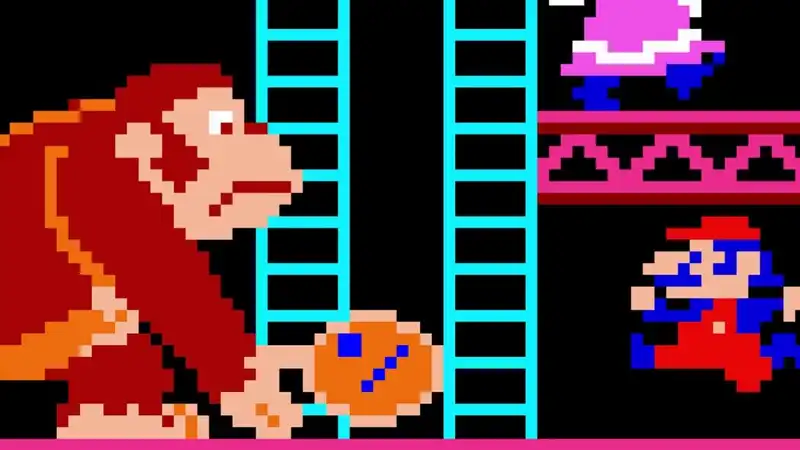Feeling that Universal owed him a favor, Scheinberg began pressuring several video game companies, including Nintendo, over King Kong, but only the creators of Donkey Kong would not give in. Instead, Nintendo fought and won a decisive victory in a trial that lasted from 1982 until the final appeal in 1984: Donkey Kong did not infringe Universal's copyright and remained a Nintendo character. Donkey Kong did not infringe Universal's copyright and remained a Nintendo character.
As with any lawsuit of this magnitude, the documentation on this case is voluminous and is housed at the National Archives. A few years ago, gaming historian Norman Caruso visited the archives and scanned and posted a rare item he found there.
One interesting twist on the matter is that creator Shigeru Miyamoto admitted that he had initially considered the name King Kong, perhaps to a fault. Among Caruso's findings are pages of other names Nintendo considered as alternatives to Donkey Kong.
Fanny Kong, Kong the Kong, Jack Kong, Funky Kong, Bill Kong, Steel Kong, Giant Kong, Big Kong, Kong Down, Kong Dong (), Mr. Kong, Custom Kong, Kong Chase, Kong Boy, Kong Man, Kong Fighter, Wild Kong, Rookie Kong, Kong Holiday, and finally Donkey Kong.
Kong Don is the most prominent funny suggestion, but the real surprise here is probably that Funky Kong, which first appeared in Rare's Donkey Kong Country series, has roots much further back than I had thought. There are many more tidbits in Caruso's post, including this bear doodle by Miyamoto and the original 1933 King Kong copyright certificate, but perhaps the best takeaway is Judge Sweet's summary of the differences between the two gorillas.
"Donkey Kong is comical and funny. The player controls Mario, a carpenter, as he climbs pink girder structures by making him climb ladders and run up ramps while avoiding obstacles such as cement vats, barrels, and beams. The goal of the game is to get Mario to the top floor, where he can free the girl from the hands of the big gorilla. Mischievous, childlike, and sexless, Donkey Kong makes a humorous [omitted] impression as he leaps and struts back and forth to tease Mario.
"Donkey Kong's gorilla is thus quite different from King Kong. King Kong is a ferocious gorilla in search of beautiful women, who goes on a rampage, chases people, crushes them underfoot or throws them to the ground, fights dinosaurs, giant snakes, planes and helicopters, all leading to tragic and bloody deaths. Silly obstacles like Donkey Kong pies, cement tubs, birthday cakes, and umbrellas, a primitive captive girl with her hair in pigtails, pleasant colors, and humorous sounds create a very different concept and feel from the King Kong drama."At best, Donkey Kong is a parody of King Kong, but this kind of parody is not an infringement."
Perhaps it is best not to talk too much about "a prim little captive girl with her hair in pigtails," but this is a brutally efficient summary of the two fictional gorillas and their world, and it even seems as if Judge Sweet is quite enjoying playing Donkey Kong ("pleasant colors and humorous sounds").
Nintendo ultimately prevailed, of course, and Judge Sweet ruled that King Kong was in the public domain and that Universal had brought the case to extract licensing fees, later ordering Nintendo to pay $1.8 million in costs. Ironically, you can now visit Donkey Kong Land at Universal's theme parks. This is a very important victory in Nintendo's history, so highly regarded that one of Nintendo's most beloved characters was named after their lawyer: John Joseph Kirby
.

Comments